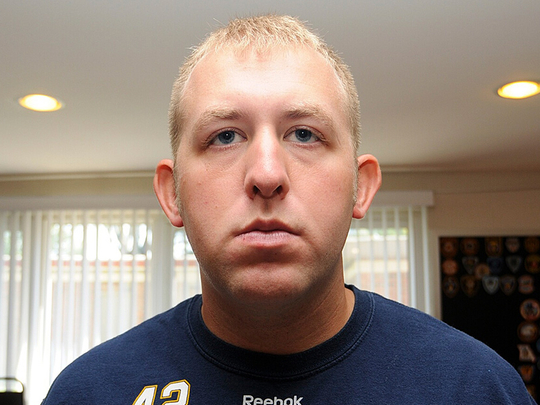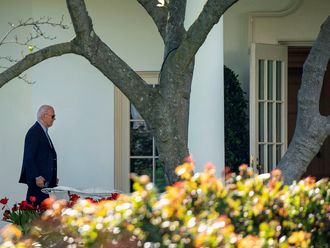
ST. LOUIS: Darren Wilson is not haunted by Michael Brown’s death.
Wilson does not think he did anything wrong. His conscience is clear.
If the Ferguson police officer had to do it all again — stop Brown on the street, then shoot him dead after a scuffle and a foot chase, stoking months of occasionally violent protest — he wouldn’t do anything different. Wilson says he feared for his life.
“I know I did my job right,” Wilson, 28, said Tuesday in an interview with ABC’s George Stephanopoulos, his first public remarks since Brown’s August 9 death.
Dressed unpretentiously in a blue-collar shirt with no tie, with a white undershirt showing, an unemotional Brown talked quickly as he painted Brown as an aggressor in every phase of the 90-second incident on the street outside the Canfield Green apartments. At one point, when Wilson grabbed Brown’s arm, Wilson said, “It was like a 5-year-old holding on to Hulk Hogan” — echoing his secret testimony to the St. Louis County grand jury.
For months, Wilson’s version of events has been the missing half of a contested narrative that has rocked the streets of Missouri and rattled the halls of Washington.
Wilson, a six-year veteran of the Ferguson Police Department with no disciplinary history, told the grand jury he had never fired his gun in the line of duty until shooting Brown at least six times that day.
Wilson’s testimony — along with other testimony and evidence in the case — was released Monday night after the grand jury declined to charge Wilson, tipping demonstrations in Ferguson into fits of window-smashing, looting and arson that spanned four square miles.
After Brown’s shooting, Wilson left his Crestwood home southwest of St. Louis and vanished before his name became public. His attorneys, provided by a police association, rarely spoke to the news media. (Wilson’s attorney, Neil Bruntrager, did not respond to a request for comment.)
Wilson’s two traceable public steps since the shooting track back to the St. Louis County seat of Clayton: the first coming when Wilson testified in front of the grand jury in September; and the second, in October, when he obtained a marriage license to wed Barbara Spradling, a fellow officer in the embattled Ferguson police force.
“We just want to live a normal life,” Wilson told Stephanopoulos.
Now, Wilson’s released testimony — and the interview with Stephanopoulos — provide glimpses of how the 6-foot-4, 95kg Wilson mentally assessed the fearsomeness of the 6-foot-4, 132kg Brown.
After an altercation at Wilson’s car led to a foot chase, Wilson said Brown turned and looked “like a demon” as he charged toward the officer, “bulking up” to run through gunshots, according to the grand jury transcript. The fatal shot entered the top of Brown’s head as he fell or leant toward Wilson.
Supporters of Brown’s family seized upon Wilson’s testimony, criticising the limitations of the grand jury process.
“A first-year law student would have done a better job of cross-examining” Wilson, family attorney Benjamin Crump said. “When was his credibility ever challenged?”
Such an opportunity came with Wilson’s interview with Stephanopoulos, held in an undisclosed location. In the first segment of the interview, broadcast Tuesday night, Stephanopoulos asked Wilson if he really needed to chase Brown after Brown ran away from Wilson’s car.
“My job isn’t just to sit and wait,” Wilson responded, saying he had to chase Brown. “That’s what we are trained to do.”
Wilson said when Brown turned and began charging, he wondered whether Brown was reaching for a weapon in his waistband. If Wilson didn’t shoot at him, he said, he wondered whether Brown “will kill me if he gets to me.” So he fired.
Stephanopoulos asked, “Is there anything you could have done differently that would have prevented that killing from taking place?”
“No,” Wilson responded.
“Nothing?”
“No.”
“And you’re absolutely convinced that when you look though your heart and your mind that if Michael Brown were white, this would have gone down in exactly the same way?”
Yes, Wilson responded. “No question.”












